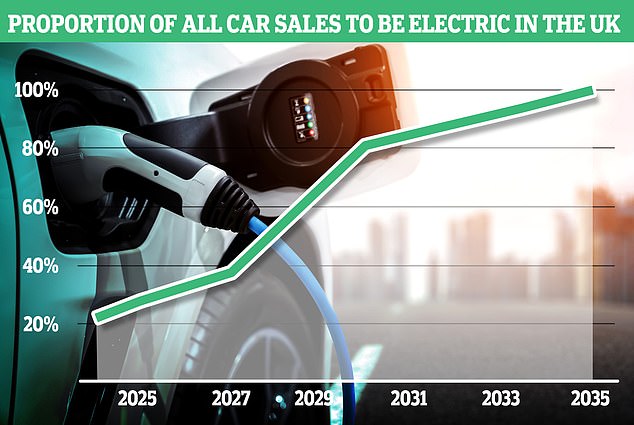Car Dealerships Ramp Up Fight Against Electric Vehicle Quotas

Table of Contents
Financial Concerns Fueling Dealership Resistance to EV Quotas
The core of the dealerships' resistance stems from substantial financial concerns. Adapting to the EV market requires significant upfront investment and presents ongoing challenges to dealership profitability. The transition isn't simply about adding a few electric cars to the lot; it's a complete overhaul of infrastructure, training, and sales strategies.
-
High initial investment in EV charging infrastructure: Installing and maintaining robust charging stations requires a considerable capital outlay, especially for dealerships with large inventories. This cost is often borne entirely by the dealership, impacting their bottom line.
-
Specialized training required for EV sales and service technicians: EVs require specialized knowledge for sales, repair, and maintenance. Training existing staff and hiring new technicians with EV expertise adds significant costs to the operational budget. This investment is crucial to ensure dealerships can offer adequate customer service.
-
Lower profit margins on EVs compared to traditional gasoline vehicles (in some cases): While this is changing as EV technology becomes more mature, some dealerships report lower profit margins on EV sales compared to their internal combustion engine (ICE) counterparts. This is due to factors such as higher initial purchase costs for customers and potentially lower service revenue over the vehicle's lifespan.
-
Challenges in managing EV inventory and logistics: Managing EV inventory presents unique challenges. EVs often have longer lead times, require specialized shipping and handling, and demand more sophisticated inventory management systems. This adds complexity and increases operational costs.
-
Concerns about reduced sales volume if the transition is too rapid: Dealerships worry that a rapid shift away from ICE vehicles could negatively impact overall sales volume before sufficient consumer demand for EVs is established, creating a significant financial risk. This fear is driving much of the resistance to stringent quotas.
Logistical Challenges and Lack of EV Infrastructure Hamper Dealerships
Beyond the financial burden, dealerships face significant logistical challenges. The lack of widespread charging infrastructure and difficulties obtaining EV parts significantly hinder their ability to effectively sell and service electric vehicles.
-
Difficulty in installing and maintaining charging stations: The installation of charging stations is not always straightforward. Dealerships face permitting issues, grid capacity limitations, and the ongoing costs of maintenance and upgrades. Reliable, fast charging is crucial to address consumer range anxiety.
-
Limited availability of EV parts and trained technicians: The relative novelty of EV technology means that parts availability can be an issue, particularly for repairs and maintenance. This shortage of parts, coupled with a shortage of skilled technicians capable of performing EV repairs, leads to longer service times and potentially dissatisfied customers.
-
Consumer concerns about range anxiety and charging convenience: Addressing consumer concerns about range anxiety and charging convenience is paramount. Dealerships play a key role in educating potential buyers and need adequate charging infrastructure to alleviate these concerns.
-
Supply chain disruptions impacting EV availability: Global supply chain disruptions can impact the availability of EVs, making it challenging for dealerships to meet consumer demand and fulfill orders in a timely manner. This adds another layer of logistical complexity.
Lobbying Efforts and Political Pressure Intensify the Battle
Facing these substantial challenges, car dealerships and automotive lobbying groups are actively engaging in political lobbying efforts to influence government policies. They are arguing for a more gradual transition to electric vehicles, emphasizing the economic and logistical difficulties of a rapid shift.
-
Dealerships engaging in lobbying efforts to delay or modify EV mandates: Major automotive groups are heavily lobbying government agencies and lawmakers to adjust or delay the implementation of strict EV quotas. This lobbying aims to create more favorable timelines and regulations for the industry.
-
Arguments presented by dealerships focusing on economic feasibility and consumer readiness: The main arguments presented focus on the financial viability of the transition for dealerships and the need to ensure sufficient consumer demand for EVs before imposing stringent quotas.
-
Potential political ramifications of imposing stringent EV quotas: The political implications are significant. Imposing overly aggressive quotas could face strong pushback from affected communities and workers. This factor is influencing the political debate surrounding EV adoption.
-
Differing stances taken by different dealership groups and manufacturers: It's important to note that not all dealership groups or manufacturers share the same position on this issue. Some are proactively embracing the EV transition, while others remain more resistant to change.
Conclusion
The debate surrounding electric vehicle quotas highlights a significant tension within the automotive industry. Car dealerships are pushing back against rapid mandates, citing substantial financial burdens, logistical challenges, and the need for a more balanced approach to the EV transition. The economic viability of dealerships, the availability of EV infrastructure, and consumer readiness are all key factors in this ongoing struggle. The arguments presented by dealerships underscore the complexities of transitioning to a fully electric vehicle market. The debate around electric vehicle quotas is far from over; stay informed to understand the future of car sales.

Featured Posts
-
 Ftc Challenges Microsofts Activision Blizzard Buyout A Legal Battle
May 19, 2025
Ftc Challenges Microsofts Activision Blizzard Buyout A Legal Battle
May 19, 2025 -
 Logitechs Next Big Thing A Forever Mouse
May 19, 2025
Logitechs Next Big Thing A Forever Mouse
May 19, 2025 -
 2025 Verwachte Daling Aantal Vliegpassagiers Via Maastricht
May 19, 2025
2025 Verwachte Daling Aantal Vliegpassagiers Via Maastricht
May 19, 2025 -
 Trumps Aerospace Legacy Assessing The Impact Of Major Deals
May 19, 2025
Trumps Aerospace Legacy Assessing The Impact Of Major Deals
May 19, 2025 -
 Cellcom Customers Face Lengthy Outage Calls And Texts Unavailable
May 19, 2025
Cellcom Customers Face Lengthy Outage Calls And Texts Unavailable
May 19, 2025
